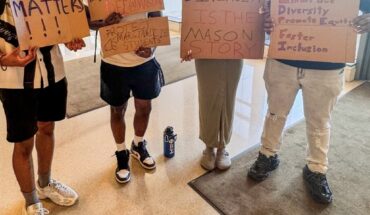(Photo credit: Alya Nowilaty/Fourth Estate)
The new bike loan program Mason had intended to begin this fall has been postponed due to unforeseen circumstances.
This decision comes after the unexpected resignation of former Transportation Coordinator Marina Budimir, who left the university in the last week and a half, according to Josh Cantor, director of Transportation Services.
“The position will probably take two months to fill,” Cantor said. “Ideally, we will have a new person beginning in January.”
Cantor hopes to launch the bike program in the spring of 2016, adding that “winter probably isn’t the best time to start a bike program.”
The program will allow students to check out bikes at no charge for a 24-hour period. Students will receive a bike, as well as a lock and key, all of which will be returned at the end of the 24-hour period. Cantor described the process as being closer to checking out a library book than to using a bike share program because the first 24 hours are free, and charges only accrue if a bike is returned late or a key is lost.
Cantor said that this program is actually based on a successful program at Virginia Commonwealth University, VCU RamBikes. The VCU program has 12 bikes that are available for students to check out for a 48-hour period. To use the bikes, VCU students check out and return them from the university’s library.
Mason’s program will differ from VCU’s since it will allow students to check bikes out from various recreation facilities on campus and return them to any other recreation facility. For example, if someone rents a bike from the Recreation and Athletic Complex (RAC), they will be able to return it to the Aquatic and Fitness Center (AFC) when they are finished using it.
The bikes that the loan program will use are from a previous Mason program, ViaCycle, that allowed students to rent bicycles for free for two hours then charged one dollar for each additional hour. Cantor said that the new program will be more focused on long-term use instead of short-term.
The ViaCycle program, which began as a graduate student project at Georgia Tech that turned into a legitimate business, expanded to Mason in 2012. Mason was ViaCycle’s second client, but the company went out of business in July 2013 just as Mason was looking to expand the program and increase the number of bikes on campus, said Cantor.
The 15 bikes left over from Mason’s ViaCycle days will be used for its new bike share program. Cantor said that depending on the program’s success, administrators may consider finding more money to purchase additional bikes or decreasing the 24-hour rental period.
In addition to establishing the Mason-operated bike loan program, Cantor said that the university plans to work with the City of Fairfax to make it easier for students to travel between the city and the university. A joint program like this might include placing bike rental locations around the city.
Right now, Cantor said, the school plans to “regroup and launch in the spring.”



